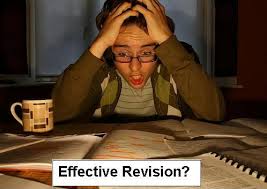7 STEPS TO EFFECTIVE REVISION

Having studied many things and attended classes for your learning and preparation for exams, you are faced with a challenge of going through studied concepts, committing the major gist to memory and be able to deliver them during your exams. Many students find this task daunting and herculean and so perform poorly in their exams.
Also, I have heard students complain that they read, attended classes and understand concepts discussed yet perform below expectation in their exams. Though many factors may have resulted in this, I think faulty revision may be the bane of such students. My aim in this article is to give you a guide that could help you in achieving effective revision; hence ensuring that you excel in your exams with ease.
I like you to know that this piece is not really meant for you who just wild away your time and just want to read and pass exams. Though you may find this useful, you cheat yourself to just get grades in school without actually learning.
Now let’s get into the steps fully.
ENSURE YOU HAVE ALL THAT’S BEEN TAUGHT
This is important because failure to do this makes you unaware of the things to revise. Guess what? When you don’t know all that has been taught or expected to cover for the term or semester, your revision is hampered because you can’t achieve complete revision. Also, know that when you don’t know what needs to be covered, you may go on reading that which is not the most relevant at the expense of the time.
But how do you know what needs to be covered? Let me show you a number of ways to do this.
Get scheme of work from teachers or class reps: This show you what needs to be covered and enables you know what has not been covered
Go through all that you have been taught in class: It shows you all that has been taught in class out of the scheme of work or course outline.
Find out what you have been ask to read up: Some teachers set in their tests and exams topics and concepts they ask students to read up, usually because of time constraints and importance of concept.
Review your projects, assignments, home works, and puzzles presented by teachers: Most teachers give you assignment, homework and project to make you have a feel of the concept discussed hence committing it permanently to memory. To know if you have really mastered concept, they usually ask you questions on those concepts; therefore review them. Also, know that puzzles presented in class by teachers are usually to make you think, read and explore. Therefore, be ready to prove to your teacher that you really thought, explored and studied to solve his puzzle.
Compare your notes and jotter with classmates : There are times you may not be in class or a teacher may not teach a topic in class but have done so in other class. To ensure you know those things, compare your notes with people in your and other classes.
Appraise Your Term Work
Having found out all that you have been taught the next thing you need to do is to make an estimate of the term work. This involves finding out how long it will take you to go through them again in readiness for your exams and what you need for it.
Find out if you need tutorial classes, meet classmates or your teacher for clarification. One of/ all of them comes up when you realize that there are concepts you have only surface knowledge and need to have in-debt knowledge of them.
Study Your Notes
Having found out what needs to be read and made an estimate of them, the next thing is to embark on the study of your notes. Now, I believe you have attended the classes and so have the details of the concepts in your class. Start the study of your notes from the basic as most times topics are thought such that the previous one makes for a better understanding of the next one.
Also, take note of the main point in your teachers notes. This can easily be found by looking out for the topic sentence in the paragraphs of your note. Put differently, find out exactly what your teacher is saying in the note he gave. Pay attention to examples, illustration and analogies that your teachers use to make their point clear. Also try to recollect stories that your teachers told in class to make points clear. This makes for recollection and retention of the details of a concept taught in class.
In the course of your study, list the salient points made in the notes. This is necessary when the teachers’ note is lengthy and full of illustration and analogies. The salient points written out is not for exam malpractice but for a quick review of major point in a topic
Also, pay attention to point pointers like: “now note…” very importantly..” and the likes. Attention to them shows you something – the major point or facts you can’t do without.
Moreover, study diagrams, graphs and tables in your notes as they are meant to help you understand concepts in another perspective. Teachers also test your understanding of in these aspects.
Review Your Jotter
Your jotter is not your class note but points made by your teacher in the course of her explanation of concepts in class. Those points may or may not be included in your note. The points written in it are usually in your own word. It may be a summary of an explanation put in your wordings. Also, in the course of the study of your notes you outlined major points in your notes and are documented in your jotter.
Assignments given in class; homework, puzzles presented by teachers and concepts for studies are usually written in your jotter. Review it! I mean, go through it! But, why? When you go through it you are concentrating on the major points made in your notes and text books and not reading details that may time may not permit. You see quickly what would have taken you so much time to read. You see points made in many pages just in few pages.
It also shows you puzzles and likely exams questions asked by teachers in class.
DON’T READ TEXTBOOK
Yes I say, “Don’t read textbook” that sounds like an advice from Satan but I think it’s good for you. You are in your revision season; eeh? Then keep your textbook by the side. Marvel not that I say, “don’t read textbook” My reason is that revision season is not a time to read your textbooks. Like earlier noted, the most appropriate materials to read are your notebook and jotter.
I have enumerated why your notes and jotter in the last two segments of this article. Now let me show you why not textbook now. It is usually voluminous and contains much information that takes time to read and extract.
Reading voluminous textbook during your revision, distract you from the most timely material to read, and result in poor revision.
In your revision season, only a perusal of highlighted point in your textbook is encouraged. A fresh study of concept is prohibited. The reason is that perusal is very similar to reading your jotter but not a fresh reading of concept.
Experience has shown that a fresh reading of voluminous material within a short time before exams results in anxiety with is a major enemy of effective revision. Save yourself from this by starting early and taking notes or highlighting salient point in your text. If you don’t have note or jotter and obviously can’t start a fresh study of textbook, borrow notebooks, and jotters and request that a fellow student give you the main gist of your note.
ASK FOR CLARIFICATION
During your appraisal, you may have realized that there are thing you just don’t understand in your textbook (read very early), notebook, solving teachers puzzle and doing home work. The best thing to do is not to go into exam hall without sorting them out. Therefore the next task is to seek clarification of such points.
But where can I get clarification? It’s from your teachers and fellow students who understand the concept and are not mischievous. Humbly go to your teacher or fellow student and beg that they explain any concept you didn’t understand. Even if insulted, persist! What sticks is the knowledge he imparts in you and not insults hurled on you; so don’t be deterred by insult in the pursuit of clarification of concepts.
To ensure you don’t forget concepts you need clarification on, write them out. Start with the most important to you; time may be a constraint and something may come up to thwart your plans. Frankly say what is not clear to you and request that he repeats a point for clarification.
Also, note that clarification can be sought from your textbook and internet. Remember fresh study of concept from textbook is not encouraged. The same applies to the use of the internet. They could be consulted like dictionary and not as notebook.
CRYSTALLIZE POINTS
Men, you are about to enter exam hall. Your are expected to be inside with the tools for the major activity inside in exam hall. The tools are simply knowledge of what you have been taught in school.
In your jotter, you outlined the points extracted from your notes, class session and textbook study. To crystallize them involves grouping all that you have read in the subject such that recalling the group makes for a grasp of other detailed points. This can be done by “tying” concepts to real life issues, using acronym and covering a long list into song or rhythm.
Success in your exams!!!!






